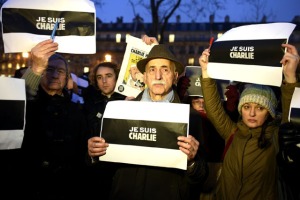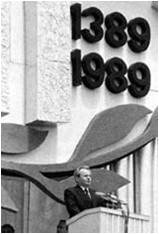History News Network | Sharpening Contradictions: Why al-Qaeda attacked Satirists in Paris.
ethnic/religious conflict
The Reign of ‘Terror’ – NYTimes.com
In today’s The New York Times, Tomis Kapitan very persuasively argues that:
“[b]y effectively placing designated individuals or groups outside the norms of acceptable social and political behavior, the rhetoric of “terror” has had these effects:
1) It erases any incentive the public might have to understand the nature and origins of their grievances so that the possible legitimacy of their demands will not be raised.
2) It deflects attention away from one’s own policies that might have contributed to their grievances.
3) It repudiates any calls for negotiation.
4) It obliterates the distinction between national liberation movements and fringe fanatics (for example, during the 1990s, the “terrorist” label was applied to Nelson Mandela and Timothy McVeigh alike);
5) It paves the way for the use of force by making it easier for a government to exploit the fears of its citizens and ignore objections to the manner in which it responds to terrorist violence.”
I hope that you will all read Kapitan’s article and consider his argument. For too long we have been captive to the rhetoric of terrorism. While it has been an incredibly effective tool for politicians and ideologues, it has hurt our ability to deal effectively with terrorism. Fear mongering dismantles our ability to think rationally. We too easily accept emotionally gratifying solutions that feel right but in reality may not be. Any real solution will not be easy, and it will require that we give up the quick-fix, emotionally gratifying responses that we keep turning to. It will also require humility and a willingness to confront our own role in creating and exacerbating the situation.
Henry Siegman, a Jewish leader speaks honestly about the history of Israel.
They are doing exactly they opposite of what they should be doing if they actually want to protect their citizens. Don’t they remember their own history?
I’m so glad to see a Jewish leader who survived the Holocaust speak out on this issue. Thank you Henry Siegman for speaking out!!
Advice that Israel Should Take But Won’t
Today in The New York Times Mustafa Akyol wrote a great piece of advice for Israel if the Israelis actually wanted to end the terrorism. It’s advice I would have given the Israelis if they had asked (ha ha!).
Gavilro Princip: Hero or Terrorist? The Origins of the First World War and the Blame Game
June 28 is Vidovdan (Saint Vitus’ Day), a sacred day for all Serbs. It marks the anniversary of the Battle of Kosovo (1389), when the Serbs were defeated by the Ottoman Turks. This is also the anniversary of the assassination of the Archduke Franz Ferdinand, which kicked off WWI. That these two events share the same anniversary is not accident. The young Gavilro Princip, who shot the Archduke of Austria and his wife Sophie, was a Bosnian Serb and a member of the Serbian nationalist terrorist organization Ujedinjenje ili Smrt (Union or Death also known as the Black Hand). The Austro-Hungarian Empire had recently acquired the Bosnian territories, previously part of the Ottoman Empire, to administer per the Congress of Berlin (1878). But this was an inopportune time to acquire these territories. Nationalism was on the rise and the peoples of these regions desired independence. They didn’t fight to throw off the yoke of the Turks to then gain a new master. The Serbs in the newly independent Serbia were not content with their independence they also wanted their Serbian brothers in Bosnia to have the same freedom that they had. Here’s where the connection between the Battle of Kosovo and the Archduke’s assassination comes in. Ferdinand, knowing full well that June 28 was a sacred day for Serbs, decided to visit Sarajevo on that day anyway. He was already hated as a figure of the Austro-Hungarian Empire but this decision sealed his fate as a target.
It may seem strange that the Battle of Kosovo plays such an important role in Serbian history. But the defeat that marked the beginning of 500 years of oppression (at least in myth) created and cultivated the distinctive Serbian character. As Thomas Emmert explains “the Kosovo ethic…expressed a basic attitude toward life itself: democratic, anti-feudal, with love for justice and social equality.” The myth that grew in the aftermath of the battle, skillfully turned a defeat into a victory. In the most popular version of the myth Czar Lazar, the Serbian prince, choose defeat because he would be rewarded with a heavenly kingdom if he did so, thus making the Serbs a “heavenly” people rather than an “earthly” people.


